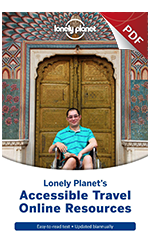For all those wanting to start the travel planning process or learn about accessible tourism destinations and experiences from around the world Lonely Planet's Martin Heng has published the Accessible Travel Online Resources guide. Martin brings a unique blend of being a person with a disability, a staff member at Lonely Planet and a person undertaking postgraduate study. Martin began the process of compiling the online resources while working on his Masters Degree at RMIT Melbourne, Australia. The press release is provided below
PRESS RELEASE
========================================================================
Lonely Planet’s Accessible Travel Online Resources
 |
| Photo 1: Resources Title Page |
1st edition – Jan 2016
ISBN 978 1 76034 444 3
Author: Martin Heng
98 pages
Available free from: http://shop.lonelyplanet.com/world/accessible-travel-online-resources-2016
Hard of hearing or vision-impaired? A wheelchair user or slow walker? Fibromyalgia, MS or spinal-cord injury? None of these should stop you from experiencing the joy and benefits of travel. We at Lonely Planet believe that travel is for all, no matter what their abilities or limitations. We also know that the first barrier to travel for many people who have access issues or a disability is a lack of information, combined with a fear of the unknown. We hope that this collection of online resources will go some way towards filling the information gap and alleviating unfounded fears, either by providing information directly or by introducing you to a host of people who haven’t let their disability get in the way of their love of travel.
· The world’s largest list of online resources for accessible travel
· Country-by-country resources from national and local government and tourism bodies, as well as disabled people’s organisations
· A wealth of experience of travelling with a disability from almost 50 personal travel blogs
· Dozens of specialised accessible travel agents and tour operators from 40 countries around the world
· Top travel tips for travelling with access issues
· Advice from experienced travellers with a disability
· Leads and links to disability-specific advice and support
· Websites dedicated to the theory and promotion of accessible travel
· Updated biannually
· Easy-to-read text
Additional copy
We all do it: come across a website, think “Oh, that’s interesting!” and bookmark it for future reference. But when surfing the web, subscribing to relevant online magazines and networking via social media and LinkedIn come to form a core part of your job – as they have for me since I became Lonely Planet’s Accessible Travel Manager – things can quickly get out of hand! And so about six months ago, I decided to go through my long list of accessible-travel-related bookmarks to assess and categorise them. I then went through my LinkedIn and Twitter connections, tracking down useful websites for travelling with access issues. I also did some research and came up with heaps more useful websites.
The result is almost certainly the largest list of online resources for accessible travel that exists. It’s still by no means exhaustive. I’m sure there will be some people who will wonder at glaring omissions, and others who will be upset that their website or business has not been included. I call on all these people to contact me at travelforall@lonelyplanet.com.au with details of websites that can be included in subsequent editions. Knowing how quickly lists such as this become out of date, with websites appearing and disappearing all the time, I’m planning to update this resource every six months. My goal is for this to become an ever-growing and ever-more-useful resource for travellers who have access issues, whether through congenital disability, injury or age.
In closing, I’d like to thank Ivor Ambrose of the European Network for Accessible Tourism (ENAT), with whom we signed a memorandum of understanding last year to pursue joint projects. This is the first! Ivor provided valuable feedback and also made sure that there are fewer glaring omissions than there would have been without his knowledgeable input.









